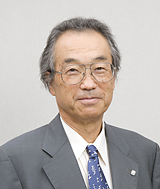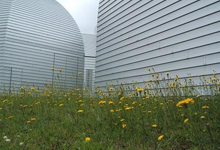
Yokohama Institute
Tomoya OGAWA, Director
Environmental policy of Yokohama Institute
Since its establishment in 2000 as the headquarters of life science research at RIKEN, the Yokohama Institute has committed itself, in cooperation with Yokohama city and the local community, to actively achieving improvements in the environment. These improvements have focused both on problems of the natural environment, such as air pollution, as well as problems of the regional environment, such as public safety.
Within our premises, we have developed green spaces through the planting of trees and lawns and have also created outdoor as well as indoor multi-functional spaces for sports and relaxation. To conserve energy, we have installed a photovoltaic generation system, automatic on-off sensors for lights as well as highly visible energy consumption monitors, raising energy awareness among staff.
Tackling environmental problems requires integrating many perspectives on energy conservation – from the natural environment, the regional environment, and the research environment – while always taking physical and mental health into consideration. To do this, the environmental awareness of each and every employee is essential, as is the collaboration of local governments and neighboring businesses.

Wild flowers at the south side of the West NMR building
I believe that it is important that our proposals take into account an awareness of the environment, while at the same time, we must also take steps to improve the research environment through projects such as the ongoing collaboration with Musashino Art University (※). We must likewise take advantage of regular meetings with local municipalities and neighboring businesses, and make use of these opportunities for further improvement.
(※) Collaboration project with Musashino Art University: The Yokohama Institute exhibits several dozen works by undergraduate and graduate students of Musashino Art University every year on its premises, with the aim of promoting cultural exchange between two fundamentally different disciplines.
Research and contribution to the environment
Environmental problems involve a deep and complex inter-dependence between factors such as global warming, energy, biodiversity and food production. It is in addressing these problems, which constitute the most pressing challenges facing society in the 21st century, and which threaten even the survival of the human race, that science and technology can make their greatest contribution toward the benefit of humanity.
From my own perspective on the phenomena of life, which I acquired from a research background in organic chemistry, I believe that solving issues on a global scale such as those connected to the environment requires two basic elements. On the one hand, it is essential that the research freedom of each scientist be upheld, while on the other, a system of top-down management must also be maintained in order to create centers for strategic integration of research results, to foster research collaborations and researcher networks, and so on.
From genomics to medicine, the Yokohama Institute conducts research across a wide range of topics in the life sciences. In terms of its contribution to improving the environment, studies conducted at the Plant Science Center (PSC) in particular are worth highlighting. Examples of research at this center include:
・ The creation of next generation bio-industries through the development of environmentally friendly biomass-based materials
・ Basic research on plant growth, including studies on the creation of ‘super-plants’ with the potential to contribute to a low carbon society
・ Studies on stress-tolerant plants that broaden the scope of food production
In addition, at the collaborative research center we operate jointly with Dowa Holdings Co., Ltd,, we are conducting an exploratory study on mosses that absorb heavy metals, with a view to developing an effluence treatment plant that can clean soils while at the same time recovering scarce resources. We are also working with one of our neighboring companies, Tokyo Gas Co., Ltd., to explore research possibilities in areas such as rooftop greenery and biotope.
Inplanta Innovations Inc., a venture company established on the basis of research results from PSC, provides technologies and resources for coping with environmental challenges to a broad range of companies and research organizations. These include, for example, technology for genetic transformation, for backcrossing, and for soil improvement.
The application to plant studies of research results from the Omics Science Center, including the creation of cDNA libraries and clones for rice plants and soybeans, techniques for creating new cDNA resources, and techniques for quantitative RNA expression analysis of whole genomes, are also expected to contribute to solving environmental problems.
In addition, the institute also hosts the Research Center for Allergy and Immunology, whose research includes studies on cedar pollen allergy, as well as the Center for Genomic Medicine, where researchers are investigating genetic and environmental factors that cause diseases. It is our hope that by sharing large-scale analysis equipment such as NMR and the life science information infrastructure with outside organizations, in particular through collaboration with businesses, universities and research organizations, we may contribute further to solving a wide range of environmental problems.